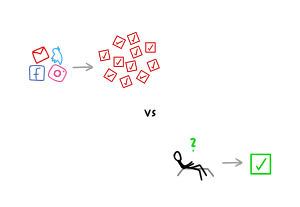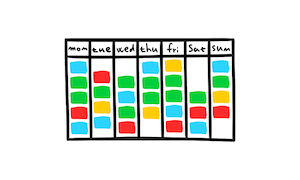3 tricks Ernest Hemingway used to avoid procrastinating
How famous writers beat procrastination
You've probably heard of Ernest Hemingway, so let's skip his accolades and dive into the practical stuff - his habits and advice on writing.
Never pump yourself dry
It's tempting to try to put in one 16-hour "hero" writing session, but Hemingway offers the following counter-perspective:
When you’re still going good and you come to an interesting place and you know what’s going to happen next, that’s the time to stop.
Interestingly, psychology has discovered that when we think back on our past experiences, the resulting mood we feel is the average of the highest (or lowest) point of the experience and the end. This is called the Peak-end rule.
As an example, you'll probably feel good about an experience that was meh, but had a great end than about an experience that started great, but ended meh.
By stopping at a high point - an interesting place in a story - Hemingway probably felt good about most of his sessions (end was great), avoiding stopping utterly exhausted and miserable, which would make the memory of a session much gloomier (end being bad).
Start by rewriting yesterday's work
The next morning, when you’ve had a good sleep and you’re feeling fresh, rewrite what you wrote the day before. When you come to the interesting place and you know what is going to happen next, go on from there and stop at another high point of interest.
When we wake up every morning, we are very close to blank slates. The mind lacks yesterday's context. We have to reach into the memory to get even an unclear picture of what we were meant to do today.
By reviewing and rewriting what we wrote yesterday, we load up all the context we need to continue where we left off.
Don't get discouraged by mechanical writing
Don’t get discouraged because there’s a lot of mechanical work to writing. There is, and you can’t get out of it. I rewrote A Farewell to Arms at least fifty times. You’ve got to work it over. The first draft of anything is shit. When you first start to write you get all the kick and the reader gets none, but after you learn to work it’s your object to convey everything to the reader so that he remembers it not as a story he had read but something that happened to himself. That’s the true test of writing.
Sometimes writing doesn't flow in the beginning. Or the middle. Or the end.
A lot of it is changing one word here, another there, making tiny improvements (hopefully).
But that's part of the whole process. We need to first get the words on the page, and then do the mechanical part, day by day, to make the work great.
Deprocrastination analysis
Hemingway's habits were a great combo for overcoming procrastination
- Great ending, great session - feeling good about one's work
The first brilliant thing he did was stopping at a high point.Many procrastinators that actually get to working on something stop once they're mentally exhausted or only once they find a problem too hard to solve.
That means they have to start at that hard place the next day, which means more trepidation.
By stopping at an interesting point, a point where he knew how the story would go, he removed this trepidation and anticipation of problems and substituted it with curiosity and joy. - Starting by reviewing = mental warm up
The rewrite what you wrote yesterday rule is another key trepidation remover.
By first reading and then editing what he wrote, Hemingway got into the right head space that naturally lead to writing the next thing.
Having a relatively easy "on-ramp" activity is smart. - Not expecting perfection from the start
The last of these three tips is also critical.Perhaps due to many movies depicting brilliant writing sessions or social media only showing the end result, many people have a picture of a creative session where great ideas just fall out of the sky.
By setting his expectations low - expecting mechanical work - Hemingway avoided the bad mood caused by expecting yourself to finally crank out that 50 pages in one day and failing.
How can you use this?
Could you start stopping at a high point, an interesting piece of work, that will make it easier to start the next day?
Could you start the day by reviewing work from the past?
Could you overcome perfectionism by counting on the process of incremental improvement?



